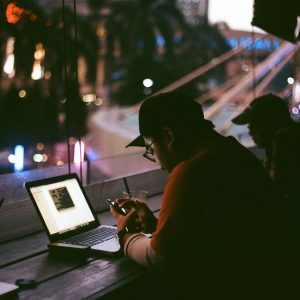20 May 2022 | Belarus, Media Freedom, News, Russia, Ukraine
The free press in Belarus is under threat like never before in the wake of the disputed re-election of Aleksandr Lukanshenka in August 2020, with journalists being threatened, fined, arrested and tortured for speaking out against the country’s ruler. Indeed, former Index employee and contributor Andrei Aliksandrau remains in prison, facing a sentence of up to 15 years for alleged “high treason”.
A year after the elections, the Belarusian authorities went a step further in clamping down on media freedom, banning the country’s journalism body, the Belarusian Association of Journalists.
Despite the challenges, the BAJ continues to receive support and, at the end of April, the organisation was awarded the 2022 UNESCO/Guillermo Cano World Press Freedom Prize.
Index spoke with BAJ chair Andrei Bastunets in the wake of the award, talking about the worsening situation for independent media and how BAJ continues to support press freedom.
Is it still possible to work as an independent journalist in Belarus following the start of the war in Ukraine?
“The key problems for Belarusian independent journalists arose before the war in Ukraine, and even before the 2020 presidential election. But after the elections – and journalists’ coverage of post-election protests – the pressure on the media, journalists and bloggers has increased dramatically (although earlier Belarus had bad ranking positions in international free speech ratings and indexes too). In 2021, many journalists and even entire editorial offices were forced to flee the country in order to avoid criminal prosecution by the Belarusian authorities and to be able to continue their professional activities.”
“A lot of Belarusian journalists – more than 100 – who were forced to leave their country chose Ukraine as a place of refuge. But after the start of the Kremlin’s war against this country, they had to leave their homes and belongings again and move to other countries. Journalists and bloggers who continue to work in Belarus face additional persecution for expressing their anti-war position. However they spread truthful information on what is happening. Last week, Baranavichy-based journalist Yury Hantsarevich was detained and accused of passing on information about Russian troop transfers in Belarus.”
How many journalists are still in detention in Belarus?
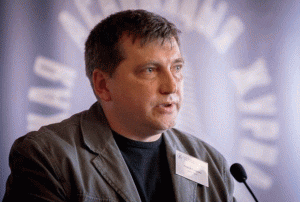
Andrei Bastunets, chairperson of the Belarusian Association of Journalists
“There are 24 journalists behind bars at the moment. Eight of them are serving their terms in prison, and the rest are in custody pending trial. All are deemed political prisoners by Belarusian human rights organisations.”
“In the first four months of 2022, five sentences were handed down against journalists in criminal cases – from 1.3 to 2.5 years in prison. The maximum punishment for a journalist has been a 15-year strict regime sentence for blogger Ihar Losik, who was a consultant for the Belarusian service of Radio Liberty.”
“My friend and former Index staff member Andrei Aliaksandrau has been in jail since January 2021; and recently the Belarusian Investigative Committee reported on the charges against him under four criminal articles, including Article 356 (high treason) which outlines a punishment of up to 15 years in prison.”
How is the war (or special military operation as Putin would have it) being reported in Belarus?
“There is a difference in the approaches of state-run and independent media outlets. In the news agenda of the independent media, the war in Ukraine is being called ‘war’ and it is on their front pages. These media outlets are publishing mostly online now because they do not have an opportunity to publish in print after printing houses and state monopoly distribution chains were banned from cooperation with the independent press. The state television and other government-backed media in Belarus are reporting on the war in Ukraine spreading the narratives of the Russian pro-Kremlin media.”
Is the BAJ still operating and is it having to do so from exile?
“In August 2021, the Supreme Court of Belarus ordered the dissolution of the organisation, at the request of the country’s Ministry of Justice. Now, BAJ is not an organisation registered by the Ministry, it is not a formal structure. It is about 1,300 people united in implementing their common idea and their mission – to expand the space of free speech in Belarus. And an official’s resolution has not affected our activities. Most of the organisation’s leadership had to leave the country after a series of police raids and interrogations by investigators, after arrests of our colleagues and friends, but we continue our work from abroad. We treat all media outlets of Belarus, regardless of whether they stayed in the country or moved abroad, as a single Belarus media sector. And we are providing all the necessary and possible support to this media sector.”
How important is the recognition through awards of BAJ, such as the Unesco award recently?
“We regard the UNESCO award as support for the entire independent journalistic community in Belarus. By the way, within literally two days, BAJ received three awards. In addition to UNESCO/Guillermo Cano World Press Freedom Prize, there was the award from the Swedish section of Reporters Without Borders (RSF) and Difference Day Honorary Title for Freedom of Expression from Brussels ULB and VUB universities. They are very important for our organisation as appreciation of our work, but even more as a high assessment of Belarusian journalists’ work in extremely difficult conditions. And, of course, it is important for us that Belarus has returned to the front pages of the international media. Although, we understand indeed that current events in Ukraine are attracting general attention as the state of affairs in the region and of the entire system of world security formed after WWII depend on their development.”
5 May 2022 | Europe and Central Asia, News, Russia, Ukraine
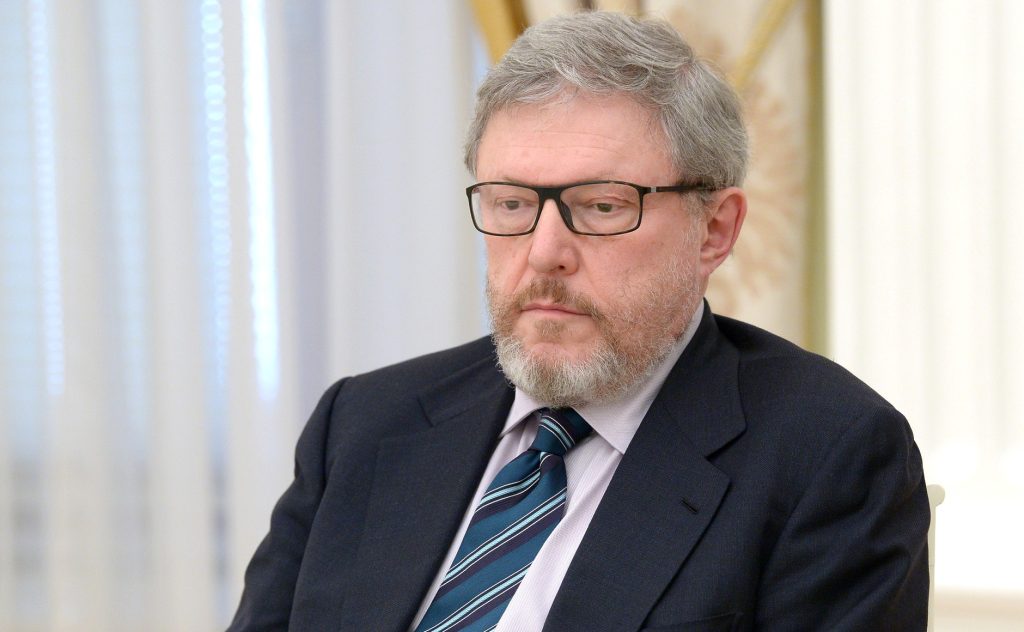
Russian politician, academic and economist Grigory Yavlinsky, who became known with his plan for a smooth transition from the Soviet regime to a free-market economy. Credit: Пресс-служба Президента Российской Федерации/Wikimedia Commons
Russian liberal politician, economist and professor Grigory Yavlinsky has long been a thorn in the side of Vladimir Putin. As the founder of the Russian United Democratic Party (Yabloko), which was the leading opposition party in post-Soviet Russia, Yavlinsky has campaigned against Putin on several occasions. In 2000 Yavlinsky participated in the Russian presidential elections under the slogan “For Russia without Dictators and Oligarchs.” In 2018, he ran in the presidential elections on an anti-corruption platform.
I first spoke to Yavlinsky in February 2012. In an interview for New Eastern Europe Yavlinsky told me he was preparing, once again, to offer Russian voters an alternative to Putin’s dictatorial reign in the Kremlin. Back then, Yavlinsky remained hopeful. “A non-democratic and corrupt system which has been created by Putin and Yeltsin, requires cardinal changes, and absolutely different politics in Russia today and important events will take place to see this happens in 2012,” Yavlinsky explained. “To change this system we need a political, economic, and moral alternative which would be supported by the people,” he added.
Today, these hopes have vanished. Why, then, do the Russian people still overwhelmingly support Moscow’s war of aggression against Ukraine? I caught up with Yavlinsky and this was the main subject I broached.
Ukraine is a subject that Yavlinsky is familiar with. He was, after all, born there, when it was part of the Soviet Union. Also, in 2018, when Yavlinsky ran in the presidential elections in Russia, he devised a plan to resolve the ongoing Russian-Ukrainian military conflict, which began in 2014.
My own interest in Ukraine is personal too. I was living in Lviv for two years. But I left the western Ukrainian city on 24 February 2022, the day of the Russian invasion.
The conversation below considers the war, as well as broader free expression battles happening in Russia right now.
Mr Yavlinsky, you were born in Lviv in 1952. Do you consider yourself Ukrainian?
I do not consider myself a Ukrainian, but I grew up in Ukraine, and studied at a Ukrainian school. I love the language and respect the culture. But regardless of where I am from, I consider the current events in Ukraine as a gigantic tragedy.
Recent surveys have indicated that an overwhelming majority of people inside Russia support this war of aggression against Ukraine. Clearly, then, it’s not just Putin’s war. Why do so many Russians support the conflict?
A lot of people [in Russia] seem to support what is happening [in Ukraine] for three reasons.
Firstly, propaganda in Russia has unfolded with great force.
Secondly, fear. Today in Russia, the fear of police and judicial harassment is huge. Finally, in Russia in the 1990s, an economic and political system was created that categorically excluded most people. It convinced the majority that they had no means of influencing what was happening in public life or the political sphere.
There also seems to be a sense that inside Russia people do not have access to their own history. Presumably this is an important weapon in Putin’s propaganda machine?
In Russia in the 1990s, the moment was missed when an honest assessment of Bolshevism, Stalin and the Soviet period should have been given. It was a huge failure in reforms, and we are now reaping the fruits of this tragic mistake. In general, people in Russia know their history very poorly.
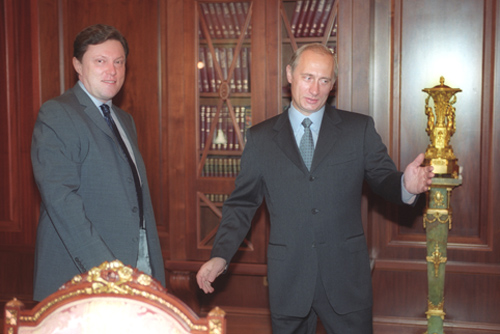
Grigory Yavlinsky pictured with Vladimir Putin in 2000, when Yavlinsky ran for Russia’s presidency. Credit: Presidential Press and Information Office/Wikimedia Commons
Is an internal coup to bring down the Putin regime possible? Or is there simply too much fear in the Russian political system?
Today I don’t see any chance of anything like a coup against Putin. He has significant support among citizens. The scale of the opposition is completely insufficient to seriously influence the change of the state system. The reason for what is happening isn’t just about Putin – the entire Russian state and economic system has led to this.
How will western imposed sanctions against Russia affect the outcome of this war in the long term? Some critics claim, for instance, that the sanctions do not go far enough. Others have pointed out that a state that descends into poverty and chaos actually strengthens an authoritarian ruler like Putin.
The sanctions in their current form will create significant difficulties for the Russian economy, but they will not lead it to collapse. The decline in living standards will affect the middle class most of all. However, state propaganda will [blame it on] external and internal enemies. On this basis, a left-nationalist policy, national socialism can be formed. Putin will try to lead this direction. He has already talked about it. Under these conditions of a dictatorship and a police state, this will be a dangerous and difficult period.
Is Putin capable of using nuclear weapons?
Yes, I think Putin may use nuclear weapons, and this should be taken seriously.
Under what circumstances could the West become involved in a military conflict with Russia?
This is a question for politicians in the West. This may be due to provocation, or to the supply of heavy weapons. As with the use of nuclear weapons, such a danger exists.
Is there any evidence to suggest that Putin could lose his grip on power if Russia continues to suffer more military defeats in its war against Ukraine?
No matter how the military situation in Ukraine develops, there are no circumstances that can lead Putin to lose control of power in the foreseeable future.
But with more and more Russian soldiers dying, could a situation arise where Putin, under political pressure, looks for a potential compromise to end the war?
A cessation of hostilities is possible. But it will only be a temporary stop. Russia wants to build a separate civilisation and considers Ukraine a part of it. Ukraine, conversely, wants to become a European country, and considers itself an independent state. In these circumstances, any truce will be temporary.
Are you surprised at how well Ukraine has responded to this conflict?
No. I’m not surprised. [Since 2014] the armed forces in Ukraine have changed. There was a patriotic unity of the people, which became the basis of real resistance. The Kremlin expected that in the east of Ukraine [after the so called “special military operation” was launched on February 24 of this year] it would be greeted with flowers by joyful crowds of people. It turned out to be an illusion. Also, the Russian leadership did not expect such unity on the part of Western countries.
Ukraine seems to be winning the public relations war too. Why is that?
This is the gap of the post-Soviet space: Russia aspires to the 19th century, and Ukraine – to the 21st. This, [in essence] is the whole conflict. All the attention and understanding of the Russian leadership is turned back: to the Second World War, to the Soviet period, to the Russian Empire. Hence, ideological cliches about a separate civilisation. Ukraine found itself in a completely different situation. Ukraine wants to change the president regularly and have independent justice, independent private property, and be a European country.
Putin continually insisted leading up to the war that Russia would not invade Ukraine. Most western and Ukrainian politicians now believe he cannot be trusted in any diplomacy going forward. Will the Putin regime have to fall before this war ends?
Putin has talked about [his plans for Ukraine] before: in 2012, in 2014 and in 2018 during the presidential elections. He announced his programme in full in July 2021 in an article entitled “On the historical unity of Russians and Ukrainians”. No one wanted to take Putin’s published doctrine seriously, either in the West, or inside [Russia]. We must understand that for a long time we will have to deal with this particular regime.
You have mentioned many times publicly that Russia is a European country. What exactly do you mean by this?
Of course, Russia is a European country. By its culture, by its mentality, by its history. The only positive prospect for Russia is the European one. Attempts to send Russia somewhere else, to make a separate civilisation out of it, are fraught with disaster and loss of the future. Right now, we are on the verge of this catastrophe. The current leadership of Russia does not understand this. It does not want a permanent, regular change of power. It does not want real elections, or an independent judicial system. And it does not want a rule-of-law state in Russia, or to have a real middle class. Because a real middle class would pose a threat to [the current Russian state]. [Which is built] on lies, propaganda, violence and a police state. That is why Putin and his entourage want to take Russia out of the European context. There is simply no alternative to Russia’s European path.
Why did corruption and kleptocracy beat transparency and the rule of law during the early years of the Russian Federation?
There was gross mistakes and crimes in the reforms. Hyperinflation in 1992 was 2600%. This led to criminal privatisation – [public] property was then transferred free of charge to persons close to the authorities. Consequently, there was a merger of property and power in Russia. A corporate mafia state was [thus] created. There cannot be an independent justice, an independent press, an independent parliament, or a state governed by the rule of law [in Russia], because all these institutions threaten the results of this criminal privatisation. This system demanded a leader like Vladimir Putin. The West turned a blind eye to all of this.
Putin’s reckless lawbreaking over the last two decades has included numerous illegal overseas assassinations . Then there is murder of domestic critics, which includes many journalists. And the jailing of numerous opposition political figures, like Alexei Navalny (still in prison) and Mikhail Khodorkovsky (who spent a decade behind bars). Has your own life ever been threatened by the Putin regime?
It is a well-known fact that it’s really dangerous to engage in politics in Russia. The biggest political crime, of course, is the murder in 2015 of Boris Nemtsov, 100 metres from the Kremlin. As for personal threats, it is completely pointless to discuss them. For the last 25 years, they have been a constant factor for [any]opposition politician inside Russia.
In 2018 you participated in the presidential elections in Russia. You presented a plan in your campaign to resolve the ongoing Russian-Ukrainian military conflict, which began in 2014. Can you discuss what that plan involved?
I participated in the presidential elections in 2018, because it was clear that this was the last election in which it was still possible to influence something. I proposed to resolve the situation in the east of Ukraine, in the Donbass, in particular, by taking the following steps.
- To propose to the countries of the Normandy Four and the United States a form of international guardianship over the “territories of Donetsk and Luhansk regions with a special order of local self-government” on the basis of the institute of international guardianship provided for by Chapter 12 of the UN Charter, using the experience of the 1995 Dayton Accords and the 1954 Saarland Status Agreements.
- To conclude a special multilateral (Ukraine, Russia, Germany, France, the USA and the EU) agreement on the temporary status of the “territories of Donetsk and Luhansk regions with a special order of local self-government” under the auspices of the UN Security Council, according to which all powers in these territories are transferred to international governing bodies, judicial proceedings, law enforcement, border control carried out by representatives of the countries participating in the agreement.
- To contribute in every possible way to the international peacekeeping forces and to ensuring the security of the population of Donbas.
- Withdraw all Russian “vacationers and militias” and all units of the Russian armed forces from Donbas. Immediately cease military, financial, diplomatic and other support for separatist forces and movements operating on the territory of Ukraine.
- To immediately stop the Russian state media inciting hatred towards Ukraine, and to stop encouraging [anti-Ukrainian] propaganda.
- To abandon the policy of “limited sovereignty” in relation to Ukraine. And for [Russia] not to hinder Ukraine’s [choice] towards the European way.
- [To ensure] the entire territory of Donbas will be transferred under the full control of Ukraine.
If you became Russian president, how would you try and transform the Russian state?
If I became president, I would build a democratic country that corresponds to the basic principles of modern European democratic civilisation: a rule of law state and separation of powers. These two institutions would stop the endless lies and propaganda. The country would certainly support me. There would be no conflict with Ukraine, but there would be a joint movement towards Europe instead.
This question is theoretical. But if you were approached by western politicians, or by the Ukrainian state, to act as a peace negotiator to end this war in Ukraine, would you consider taking on such a diplomatic position?
Such negotiations require powers that [right now] don’t exist. Without a serious change in attitude to the negotiations on the part of the Kremlin, it is impossible to change anything for the better. Personally, I am ready for literally any action that could lead to a ceasefire agreement.
You have lived through decades of the Soviet Union, and 22 years of the Putin years. What will the future of Russia look like?
It is very difficult to talk about the future now. It is completely unclear how the present will end. What is happening today is a tragic end to the old Russia, which was founded in 1917 and whose post–Soviet modernisation did not take place after [1991]. To remake and rebuild Russia we cannot just replace one president with another. It will be necessary to create a different political and economic system within the country. In the foreseeable future, I expect big problems, and very difficult years ahead.
Is there anything that gives you hope?
I believe in the future of Russia. There are people in Russia, many of them, who are ready to devote their lives to the creation of a New Russia and, finally, to complete the stage of more than a century of deviation of our country from modern civilisation.
Grigory Yavlinsky currently lives in Moscow, where he teaches at the National Research University Higher School of Economics. He is the author of many books including Realeconomik (2011) and The Putin System (2019)
JP O’ Malley is a freelance book reviewer, cultural critic, writer and journalist. He currently lives in Split, Croatia. He can be found on Twitter @johnpaulomallez
29 Apr 2022 | China, Media Freedom, News, Russia, Ukraine
Physical attacks on journalists have increased dramatically over the past year, according to the latest annual report from the Council of Europe Platform on media freedom in Europe.
The platform, of which Index on Censorship is a partner, reports on serious threats to the safety of journalists and media freedom in Europe in order to reinforce the Council of Europe’s response to the threats and member states’ accountability.
The new report, Defending Press Freedom in Times of Tension and Conflict, reveals that the number of cases involving the safety and physical integrity of journalists has jumped by 51% year-on-year, with 82 cases reported to the platform.
Many of the attacks on journalists have taken place during public protests.
“Violence against journalists during street protests is fed by a wave of media bashing and an avalanche of hate speech on social networks – very often prompted by political figures – which directly target journalists, questioning their independence and legitimacy and therefore making them more vulnerable to physical aggression,” the report says.
Overall, the number of alerts in all categories published by the CoE platform has sky-rocketed to 280 in 2021, up from around 200 in 2020 and more than double the level reported in 2016. Of the 280 alerts, 110 related to the harassment and intimidation of journalists.
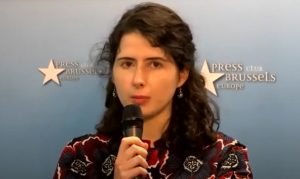
Index’s policy and campaigns manager Jessica Ní Mhainín
Speaking at the launch of the report, Index’s policy and campaigns manager Jessica Ní Mhainín highlighted cases of impunity in CoE’s report.
“Impunity for crimes against journalists refer to failure of states to identify, prosecute and punish anyone including the assailants and masterminds involved in committing a crime against a journalist,” she said. “Cultures of impunity contribute to self-censorship by making journalists more vulnerable to pressures out of fear of reprisals or harm.”
Some 35 cases of impunity have been registered on the platform since 2015 and two new impunity cases – those of Turkish journalist Uğur Mumcu, murdered in 1993, and Turkish-Cypriot journalist Kutlu Adalı, murdered in Cyprus in 1996 – were added to the impunity category during the year.
“In 2021, we welcomed the Slovak Supreme Court’s decision to overturn the not-guilty verdicts of the suspected masterminds of the 2018 murder of journalist Ján Kuciak and his fiancée Martina Kušnírová. The case will be heard in the Specialized Criminal Court later this year,” said Ní Mhainín.
Last year also saw the publication of a 438 page-report from the public inquiry into the assassination of investigative journalist Daphne Caruana Galizia, which concluded that the state of Malta “must bear responsibility for the assassination because it created an atmosphere of impunity”.
“We once again call on the Maltese authorities and the Commission of Experts to implement the recommendations of the Public Inquiry,” said Ní Mhainín.
Russia, Turkey and Ukraine account for 60% of all the cases relating to impunity on the platform. Last October marked the 15th anniversary of Russian journalist Anna Politkovskaya’s murder.
Ní Mhainín said, “The masterminds of her murder are still at large, sending the incredibly dangerous message that killing a journalist is a low-risk crime.”
Yet impunity is not restricted to these countries.
A BBC Spotlight investigation has uncovered serious concerns over the police investigation and the failure to prosecute those behind the murder of Irish journalist Martin O’Hagan, who was killed in September 2001 for his reporting on paramilitary activities in Northern Ireland. The concerns raised in the programme, which aired on 2 March 2022, came in the wake of several Police Ombudsman reports that uncovered collusive behaviour between the police and loyalists in Northern Ireland. According to the BBC’s investigation, police did not act on important information – including individual names – that were handed over to them within 48 hours of the murder. The journalist’s family are now taking legal action against the Police Service of Northern Ireland (PSNI) and the Ministry of Defence.
“Press freedom is the canary in the coal mine – it is a key indicator of the clear and worrying degree of democratic backsliding that is taking place across Europe,” said Ní Mhainín. “That’s why we once again call on Council of Europe member states to ensure that the highest priority is given to conducting thorough and transparent investigations into all crimes against journalists and we remind member states of the 2016 Recommendation of the Committee of Ministers which requires states ‘adopt appropriate criminal law provisions to prevent impunity’”
22 Apr 2022 | Afghanistan, China, France, Israel, Opinion, Palestine, Russia, Ruth's blog, Ukraine, United States
I regularly start my weekly blog with the exclamation “there is just too much news!” Too much horror and heartbreak and this week the assertion is all too true.
Russia has invaded a sovereign country and daily we are seeing evidence of war crimes on the continent of Europe; China is arresting yet more democracy activists on the flimsiest of excuses; there have been bombings targeting schools in Afghanistan; a neo-fascist is, yet again, in the final run-off in the French Presidential elections; there are riots in Sweden against the far-right with dozens hurt; people are starving in Shanghai under Covid-19 restrictions; there is active conflict again in Jerusalem, with over 150 Palestinians hurt in clashes after a series of terror attacks targeting Israelis in recent weeks; another video of a black man being fatally shot by the police has emerged in the US – Patrick Lyoya was killed, while being held on the ground, defenceless, on 14 April and riots have followed in Michigan.
Our team at Index is working on every one of these news stories. We work with people on the ground, and we commission dissidents and writers, in country, to give us a first-hand account. In the twenty-first century we can speak to people in every corner of the globe, as events are happening, because of the internet and the social media platforms which afford us all a level of protection because of end-to-end encryption. We work with people on the ground who would be arrested, tortured, or even killed because they want to share their experiences with the world. They want the world to know what is happening to them and to their communities. They are on the frontline in the perpetual fight for our democratic right to freedom of expression. They are vulnerable because of who they are and what they want to share with us, whether that’s their writings, their opinions or their art.
They are brave and inspirational and determined to stand up for what is right. For as long as they want to tell their stories there is a moral onus for us to listen to them.
Which brings me to the current proposals to regulate our online lives currently being progressed in the European Union and in the United Kingdom. In Europe, today (Friday) the final negotiations on the substance of the Digital Services Act are underway and, in the UK, the Online Safety Bill began its parliamentary journey on Tuesday. Index is working actively with partners to try and mitigate the worst aspects of both pieces of legislation and we were in Brussels this week to make the case for additional protections for freedom of speech. Our overriding goal is to make sure that our access to those brave dissidents is protected and that our rights to discuss the detail of these horrors are protected. To make sure that while legislators are trying to ‘protect’ us online they don’t end up inadvertently silencing us.
Index advocates for free expression within the protections afforded to us by the European Convention on Human Rights. There is no right not be offended. There is no right not to see things online, or in real life, that will upset you. Of course, we all want to protect each other from seeing the worst aspects of human life – that’s an admirable aspiration but it isn’t the grounds for making new law. In fact, it’s the exact opposite – legally we have protected freedom of expression, it’s a fundamental right. I have written before about our concerns regarding online regulation and in the coming months I’ll be writing extensively on it – but we start with the basic principle – what is legal to say should be legal to type. And that should be the case whatever any new legislation seeks to amend.





